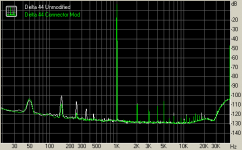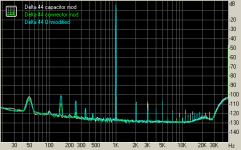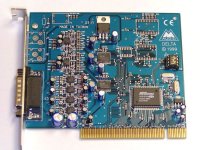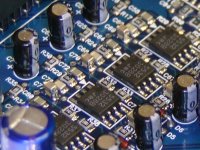Hi guys,
I recently set up a new PC at home. I've done all the usual quieting mods to it; running a quiet power supply (A Corsair HX520W), using a large passive CPU heatsink, fitting a very quiet Nexus 120mm case fan, mounting the hard drive on foam with elastic, and lining the case with sound absorbant foam. The result is a really quiet machine.
My goal is to use this machine for a bunch of things; listening to music (I've ripped all my CDs to FLAC files), recording my guitar (via a pod) and other assorted instruments, and testing amplifiers.
To do this, I installed an M-Audio Delta-44 sound card. This is a four-channel balanced I/O unit, that appears to have fairly good specs (96KHz/24 bit ADCs and DACs with 99/103dB SNR and 0.0023/0.002% THD), at least for the price.
I had a good look at it before installing it, and noticed that it appears to have a little room for improvement, at least at the quick glance before I threw it into the PC and tried it out.
Firstly, it uses JRC 5532 opamps. These are reasonably good, but I figure I might get slightly better SNR and THD by substituting something a little better, say OPA2132s. I've got a couple of dozen of these kicking around, so I might have a go substituting them.
Secondly, the power supply doesn't look terribly special - I imagine it could be decoupled somewhat better.
Has anyone tried modifying a Delta-44? If so, I'd be appreciative of recommendations. Ideally I'd like to use it to replace my Tektronix SG505 oscillator and AA501A distortion analyser, which together allow me to measure down to 0.0013% THD (on a good day!).
Also, I'm running Ubuntu Linux. I've run into some difficulty finding audio analysis tools that run under Linux (via ALSA). Thus far, the only way I've found of doing loopback tests, for example, is to generate a tone in Audacity, loop it, then do an FFT of the resultant waveform. It's not really adequate, as the FFT window in Audacity only goes down to -80dB, so I don't see a thing. Has anyone found anything better?
I recently set up a new PC at home. I've done all the usual quieting mods to it; running a quiet power supply (A Corsair HX520W), using a large passive CPU heatsink, fitting a very quiet Nexus 120mm case fan, mounting the hard drive on foam with elastic, and lining the case with sound absorbant foam. The result is a really quiet machine.
My goal is to use this machine for a bunch of things; listening to music (I've ripped all my CDs to FLAC files), recording my guitar (via a pod) and other assorted instruments, and testing amplifiers.
To do this, I installed an M-Audio Delta-44 sound card. This is a four-channel balanced I/O unit, that appears to have fairly good specs (96KHz/24 bit ADCs and DACs with 99/103dB SNR and 0.0023/0.002% THD), at least for the price.
I had a good look at it before installing it, and noticed that it appears to have a little room for improvement, at least at the quick glance before I threw it into the PC and tried it out.
Firstly, it uses JRC 5532 opamps. These are reasonably good, but I figure I might get slightly better SNR and THD by substituting something a little better, say OPA2132s. I've got a couple of dozen of these kicking around, so I might have a go substituting them.
Secondly, the power supply doesn't look terribly special - I imagine it could be decoupled somewhat better.
Has anyone tried modifying a Delta-44? If so, I'd be appreciative of recommendations. Ideally I'd like to use it to replace my Tektronix SG505 oscillator and AA501A distortion analyser, which together allow me to measure down to 0.0013% THD (on a good day!).
Also, I'm running Ubuntu Linux. I've run into some difficulty finding audio analysis tools that run under Linux (via ALSA). Thus far, the only way I've found of doing loopback tests, for example, is to generate a tone in Audacity, loop it, then do an FFT of the resultant waveform. It's not really adequate, as the FFT window in Audacity only goes down to -80dB, so I don't see a thing. Has anyone found anything better?
Some progress
I found a pretty good guide to Delta-44 modding:
http://www.nitehawk.com/sm5bsz/linuxdsp/hware/delta44.htm
One of the main recommendations was to cut the mounting tabs on the DB-15 connector, which short the analog ground to the PC chassis. I did this, and had an immediate improvement in mains rejection, by around 6-7dB.
I also worked out how to get RMAA working under Linux (sorta, anyway). I run it under XP in VirtualBox. I couldn't get the sound working properly under VirtualBox, so I simply export a test .wav from RMAA, then use Audacity to record while playing the .wav. I export the result from Audacity, and open it with RMAA.
One question. RMAA reports the Delta 44 card as having a noise floor of -98.0dB unmodified, and -98.1dB modified. How do they calculate this? From looking at the spectrum, I make the noise floor about -98dB unmodified, and about 105dB modified...
Next I'll try increasing the capacitance around the 5V regulator, and around the codecs.
I found a pretty good guide to Delta-44 modding:
http://www.nitehawk.com/sm5bsz/linuxdsp/hware/delta44.htm
One of the main recommendations was to cut the mounting tabs on the DB-15 connector, which short the analog ground to the PC chassis. I did this, and had an immediate improvement in mains rejection, by around 6-7dB.
I also worked out how to get RMAA working under Linux (sorta, anyway). I run it under XP in VirtualBox. I couldn't get the sound working properly under VirtualBox, so I simply export a test .wav from RMAA, then use Audacity to record while playing the .wav. I export the result from Audacity, and open it with RMAA.
One question. RMAA reports the Delta 44 card as having a noise floor of -98.0dB unmodified, and -98.1dB modified. How do they calculate this? From looking at the spectrum, I make the noise floor about -98dB unmodified, and about 105dB modified...
Next I'll try increasing the capacitance around the 5V regulator, and around the codecs.
Attachments
I increased the capacitance on the output of the 7805 and 2.5V reference line (C25 and C61) from 10uF to 100uF. I also added a 1uF 16V 0805 ceramic on top of the 100n 0805s that were bypassing these.
Next, I swapped the 10uF electros around the codecs for 100uF ones, and added 1uF 16V 0805 caps on top of the 100n 0805 caps that were bypassing the codec analogue supply and ref supply.
Finally, I added 1uF 16V 0805 ceramics on top of the 100n 0805 ceramics bypassing all the JRC5532 opamps.
The results of this mucking about is shown in the attachment. Harmonics of 50Hz are reduced significantly. However the 50Hz fundamental is still there (indeed up a couple of dB), and it's degraded the THD a little (RMAA reports 0.0013% rather than the previous 0.0011%).
Next, I swapped the 10uF electros around the codecs for 100uF ones, and added 1uF 16V 0805 caps on top of the 100n 0805 caps that were bypassing the codec analogue supply and ref supply.
Finally, I added 1uF 16V 0805 ceramics on top of the 100n 0805 ceramics bypassing all the JRC5532 opamps.
The results of this mucking about is shown in the attachment. Harmonics of 50Hz are reduced significantly. However the 50Hz fundamental is still there (indeed up a couple of dB), and it's degraded the THD a little (RMAA reports 0.0013% rather than the previous 0.0011%).
Attachments
suzyj said:I increased the capacitance on the output of the 7805 and 2.5V reference line (C25 and C61) from 10uF to 100uF. I also added a 1uF 16V 0805 ceramic on top of the 100n 0805s that were bypassing these.
Next, I swapped the 10uF electros around the codecs for 100uF ones, and added 1uF 16V 0805 caps on top of the 100n 0805 caps that were bypassing the codec analogue supply and ref supply.
Finally, I added 1uF 16V 0805 ceramics on top of the 100n 0805 ceramics bypassing all the JRC5532 opamps.
The results of this mucking about is shown in the attachment. Harmonics of 50Hz are reduced significantly. However the 50Hz fundamental is still there (indeed up a couple of dB), and it's degraded the THD a little (RMAA reports 0.0013% rather than the previous 0.0011%).
Suzy,
It is difficult to get lower distortion figures than a 5532/4
when they are set up correctly.
They are however susceptible to common mode distortion.
Might be worth to see if it is at all possible to balance impedances
(R and C) looking into the + and - IP's of 553x opamps.
The only opamps I would suggest replacing them with is some of
the newer breed of National devices such as LM4562 and it's
cousins.
http://www.national.com/pf/LM/LM4562.html
I will shortly be doing same thing myself but with EMU1212M
sound card - however it already has A DR of close to
120dB with distortion <0.001%. It will be interesting to see if I
can improve it.
Good luck.
Terry
Yeah, I think I'm limited by the distortion limits of the AK4524 rather than the opamps. It's only supposed to manage 100dB SINAD and I've already cracked that.
It led to a slightly manic moment (actually a manic good few hours) the other night researching CODECs. I started with seeing if there might be a pin-compatible replacement for the AK4524, and ended with beginning the design on a "no holds barred" sound card, with PCM4220 ADC and PCM1792A DAC. Throw in a Xilinx spartan 3 to interface to PCI, and some nice opamps, and a well laid out multi layer board...
But then I came to my senses. The Delta 44 is plenty good enough to be going on with.
🙂
It led to a slightly manic moment (actually a manic good few hours) the other night researching CODECs. I started with seeing if there might be a pin-compatible replacement for the AK4524, and ended with beginning the design on a "no holds barred" sound card, with PCM4220 ADC and PCM1792A DAC. Throw in a Xilinx spartan 3 to interface to PCI, and some nice opamps, and a well laid out multi layer board...
But then I came to my senses. The Delta 44 is plenty good enough to be going on with.
🙂
suzyj said:Yeah, I think I'm limited by the distortion limits of the AK4524 rather than the opamps. It's only supposed to manage 100dB SINAD and I've already cracked that.
It led to a slightly manic moment (actually a manic good few hours) the other night researching CODECs. I started with seeing if there might be a pin-compatible replacement for the AK4524, and ended with beginning the design on a "no holds barred" sound card, with PCM4220 ADC and PCM1792A DAC. Throw in a Xilinx spartan 3 to interface to PCI, and some nice opamps, and a well laid out multi layer board...
But then I came to my senses. The Delta 44 is plenty good enough to be going on with.
🙂
I have thought along similar lines, and have an old CS5397 eval
board, but in the end the EMU1212M cost 140 bucks and does
nearly the same spec.
WRT ADC's - yes that seems to be the bottle neck currently.
That new TI chip you mentioned, the 4220 looks very good -
but I'd put money on the AD7762 ADC from analog devices. It's not
marketed as an audio device but check the FFT's on page 10 of
data sheet and you get the picture, it has extreme linearity.
cheers
Terry
suzyj said:
Also, I'm running Ubuntu Linux. I've run into some difficulty finding audio analysis tools that run under Linux (via ALSA). Thus far, the only way I've found of doing loopback tests, for example, is to generate a tone in Audacity, loop it, then do an FFT of the resultant waveform. It's not really adequate, as the FFT window in Audacity only goes down to -80dB, so I don't see a thing. Has anyone found anything better?
One option is free (as in beer), but not Open Source/Free (as in speech).
This is baudline, which I have used on a borrowed Ubunto laptop and works really well. There are a few quirks - the A weighting filter is wrong way up in my version, but overall it is excellent.
See
http://www.baudline.com/index.html
- Status
- Not open for further replies.
- Home
- Source & Line
- Digital Source
- M-Audio Delta-44 and instrumentation under Linux



